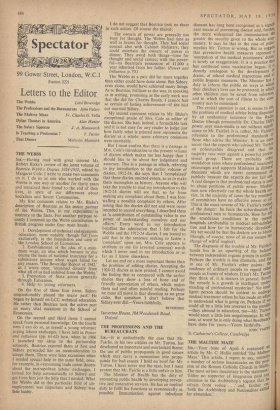THE PROFESSIONS AND THE BUREAUCRATS
SIR,—It is undoubtedly the case that Mr. Fairlie, in his two artWes on Mr. Turton, has developed an important and overlooked theme, the use of public propaganda in good causes which may carry a momentum into propa- ganda for bad causes. I hold no brief for Mr. Turton, T have never met the man, but I must protest that Mr. Fairlie is a little unfair to him.
The Minister of Health has the duty of promoting public health by developing preven- tive and restorative services. He has an implied duty to fulfil his functions as economically as possible, Immunisation against infectious
diseases has long been recognised as a sigoifi cant means of preventing disease and, further the more widespread the immunisation tla greater the security given to the whole cool munity. It may be that in the case of polio myelitis Mr. Turton is wrong. But to sugges that preventive health measures represent t 'usurpation of the medical practioners' duties is surely an exaggeration. It is a practice tha has continued since vaccination began; it •1'1 directly analogous to the development 01I drains, of school medical inspections and cril public hygiene measures. The Minister has t duty to inform the public on ways in whici: their children's lives can be protected, in whic' other children may be saved from infection and in which the cost of illness to the cost munity may be minimised.
The crucial question is not, is seems to
the problem of medical advice being dispeasa` by an unchummy successor to the Radi,r Doctor (though presumably Dr. Charles Hifi,t power over mass-media is not without sign.', cance to Mr. Fairlie). It is, rather, Mr. Fairle5, reference to the professional standards 01 those who advise the Minister. It is an oPen secret that the experts who advised Mr. Turtos on poliomyelitis disagreed and that the majority vote wdnt against a powerful profes' sional group. There are probably othef scandalous cases where professional unaninl encourages and supports Ministers in illibera decisions which are never commented 011 publicly because the experts do not fall oat; A real danger is that professional status is use", to abuse positions of public power. Medical men now effectively run the whole health ser vice. In the majority of cases the lay membe,re, of committees have no effective power at at' This is the exact reverse of Mr. Fairlie's nati0!! of the danger : he fears the subordination ct professional men to bureaucrats. How far al the scandalous conditions in the ments hospitals attributable to medical self-satisfae: tion and how far to bureaucratic directioty My bet would be that the doctors are to WO (though, of course, none of us can escape the charge of wilful neglect). The diagnosis of the trouble at Mr. Fairlie's hands lies in an upsetting of the balance between independent organic groups in societP Perhaps the trouble is less dramatic, and lies in one of Mr. Fairlie's other points: the tendency of ordinary people to regard othe,,r people as founts of wisdom. It isn't Mr. Turte,"„ they think of, it is doctors in general. Sure" the remedy is a growth in intelligent under' standing of professional mysteries? No inteh ligent person should be content to undet medical treatment unless he has made an etica' to understand what is going on. Perhaps if vie could all be a little less reverent to the Pundit!, —they abound in education, too—Mr. Turte:: would seem a little less megalomaniac. in at case, at worst he is only doing what Beechanl s have done for years.—Yours faithfully,
/OHN


































 Previous page
Previous page